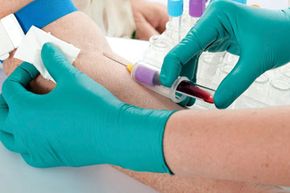You really only need three things to become pregnant the old-fashioned way. You need an egg. A woman needs to ovulate and have regular menstrual periods to become pregnant. You need sperm. A man needs to produce healthy sperm. And you need to have sex.
While baby-making seems pretty easy, the reality of getting pregnant can be a bit tricky. You need to have sex regularly, and that sex needs to be well timed (increase the romance a few days before ovulation for the best chances). Sometimes it's more than bad timing, though. More than 6 million American women are considered infertile, which means they have had unprotected sex regularly for six months to a year (depending on age) and haven't become pregnant or haven't been able to carry a pregnancy to term [source: Centers for Disease Control and Prevention].
Advertisement
See, in addition to well-timed sex, your body also needs to have all its processes well timed. And for many women, that timing is off. One of the most common reasons why this well-coordinated arrangement may get thrown off-balance? Hormones.
Hormones run the ovulation process, which works like this:
At the beginning of a woman's menstrual cycle, the brain signals the pituitary gland that it's time to prep some eggs. The pituitary gland produces a hormone called the follicle-stimulating hormone (FSH), which in turn signals the ovaries to begin maturing eggs for this cycle. As these follicles mature, the level of estrogen in the body rises, signaling the pituitary gland that an egg is ready. This first half of the menstrual cycle is called the follicular phase.
When high estrogen levels signal an egg is ready, the pituitary gland then produces a luteinizing hormone (LH), triggering the ovary to release the mature egg -- ovulation usually occurs about 24 to 48 hours after this LH surge [source: American Pregnancy Association]. The day ovulation happens is the first day of the second half of the cycle, the luteal phase.
During the luteal phase of the menstrual cycle the ovaries (specifically the corpus luteum, which is the follicle that produced the mature egg) begin to increase the levels of progesterone in the body. Progesterone is a hormone that prepares the lining of the uterus for pregnancy. If the egg is fertilized and implants, the body continues to produce progesterone -- and if not, then progesterone levels fall, and that month's menstrual period begins.
If the timing is off in any part of the process, ovulation may be disrupted, causing fertility problems. Let's look into how these hormones can negatively impact fertility, as well as some ways to tell if your own hormones are out of line.
Advertisement


